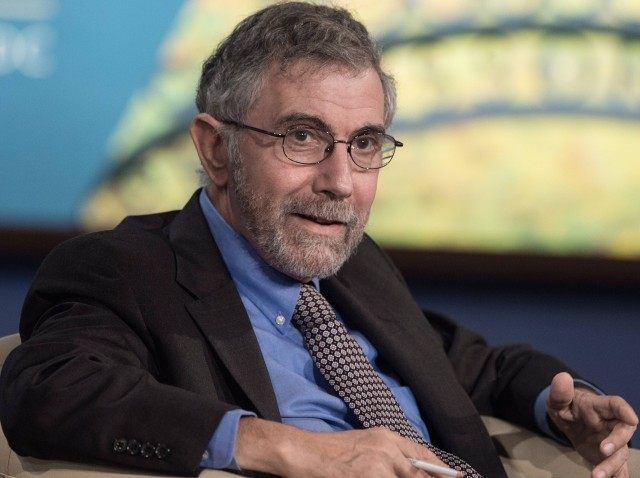Heritage Foundation Distinguished Visiting Fellow and former Wall Street Journal contributor Stephen Moore squared off against New York Times columnist Paul Krugman in a war of economic arguments that pitted free market, supply-side economics against statist, Keynesian Obamanomics.
(Breitbart News interviewed Moore leading up to the big debate for a preview of what was to come, and some in-depth comments from Moore.)
During the moderated debate Moore and Krugman were asked: Will Obamacare lead to socialized medicine?
“I would like it to lead to single-payer,” Krugman said, before suggesting that Medicare works quite well and is even “extremely popular.” He described Obamacare as a hybrid between private sector and centralized healthcare systems.
Gallup polling shows dissatisfaction with Social Security and Medicare from January 2001-2015. There was a small satisfaction increase leading up to the implementation of Obamacare in January 2014, followed by a marked return to dissatisfaction. As of September 2012, Americans held a 53-43 pessimistic view that Medicare would provide those over 65 with adequate healthcare in 20 years.
Moore noted that healthcare “prices have risen spectacularly out of control.”
Krugman attempted to persuade the audience otherwise: “It’s not actually true that healthcare costs rise,” he said, claiming that centralized systems lower costs.
Moore countered, “The reason that you’re wrong about the driving up of cost–here’s the thing, look at laser surgery, it’s not covered by insurance, and what’s happening with laser surgery, the costs are falling because the government isn’t paying for it.”
Breitbart News has continually reported on skyrocketing Obamacare premiums and the influential role that they will play in the 2016 elections.
These dueling economic perspectives continued to play out in a discussion over minimum wage laws and rate increases.
While Krugman argued that the effect of rising minimum wages on unemployment was zero, he advocated for raising the rate to $15 per hour, seemingly the magic number among advocates of such measures.
Moore pressed that minimum wage workers are largely those under 25, many of whom work in the retail industry. He then stated, “This is a very sinister trend, if people don’t start working until 22 or so, they don’t catch up.”
He cited Milton Friedman, who said, “I have often said that the most anti-black law on the books of this land is the minimum wage law.”
He then asked Krugman if he would at least consider a lower minimum wage for teens, but was met with meager consideration from his opponent.
The battle of blue-state-versus-red-state economics drew each man to his corner defending the position that states with his own economic views enjoyed greater success. Each man brandished charts in defense of his own position.
Moore pointed to 1990-2014 job growth in lower-tax Texas and Florida trumping growth in blue states California and New York. Krugman’s contention was merely that air conditioning explained job growth in regions with warmer temperatures.
Moore pointed to socialist government failures like Greece, challenging Krugman to come up with one socialist government with winning economic policy results.
Moore and Krugman conflicted over welfare trends and the role of welfare. Moore said if the bottom 20% isn’t working, then they won’t rise out of poverty. Krugman advocated for more welfare, and “a stronger safety net.”
Moore noted welfare reform by President Bill Clinton and Republicans in 1996 that saw some success, but was followed by changes during President George W. Bush’s term.
Each man closed with three issues he would prioritize. Krugman asserted negative effects of land use restrictions, universal pre-K education, and beefed-up union bargaining power. Moore focused on the contaminating touch of unions, said that “marriage is one of the great economic institutions of our time,” and advocated for a simple 16 or 17 percent across-the-board tax rate: “Let’s blow up the tax system,” he said.
Follow Michelle Moons on Twitter @MichelleDiana

COMMENTS
Please let us know if you're having issues with commenting.